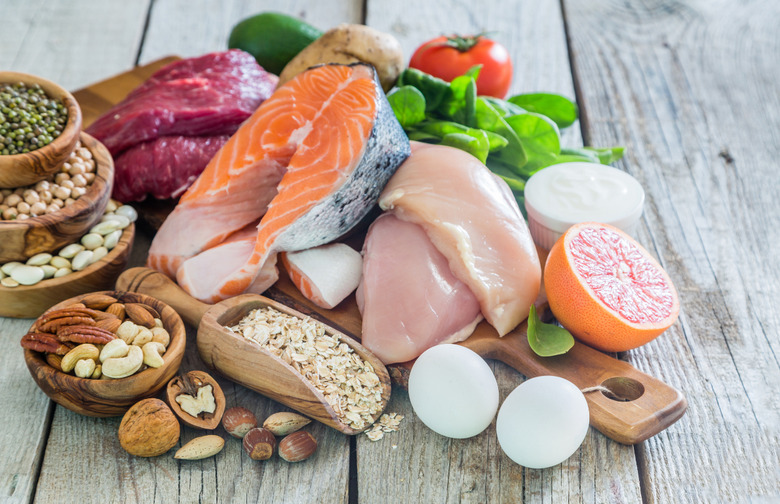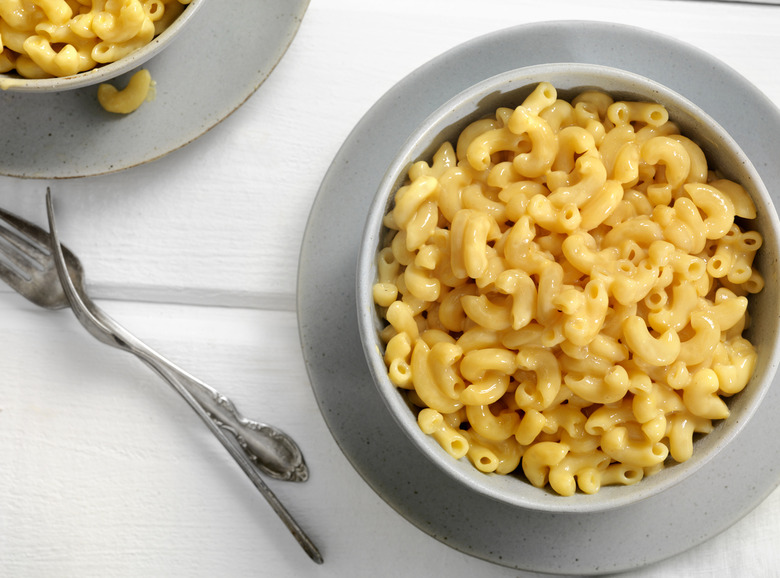20 Lessons We Learned About Food In 2017 Slideshow
We live in the midst of a shifting mindset surrounding food, fueled by studies and research that debunk previous assumptions we had about food and dieting. People are trying all kinds of diets, fasting intermittently, and cutting out ingredients in the name of their health. Some of these attempts have been fueled by science. Some haven't.
We've discovered breakthroughs in previous years that made it okay to eat fat again (so long as it was fat from almonds) and a good thing to eat more calories. Every year we're learning something new about the way we should eat for optimal health and (hopefully) learning how to live to live longer and better with every piece of news. This year, some previous conclusions have been questioned — and some big breakthroughs have appeared.
Are only almonds the good kind of fat, or does lard play a role in our health as well? Should we always be eating clean, or has even that been debunked? 2017 was a big year for nutrition and health science. While some 'breakthrough' conclusions seem like old news, some have been huge shockers for the health and nutrition world. Without further ado, here are the biggest lessons we learned about food in 2017.
All Fats Are Good Fats
In an intriguing turn of events, the term "healthy fats" became somewhat meaningless. A long-term study revealed that all types of saturated and unsaturated fats had similar beneficial effects on longevity. So whether you're eating avocados or straight slabs of butter, the effects are somewhat the same. Study participants eating any type of fat experienced an increased likelihood of longevity, across the board.
Americans Eat More Protein Than They Need
Health experts everywhere have been recommending protein for a long time, and for good reason — protein helps to build muscle, repair tissue, and keep bodily processes moving. That's why protein works to fight hunger for longer. It's giving the body what it needs to work well. But all the emphasis on protein may have gone too far. Americans are eating way more than they need to be.
To figure out how much you need, simply multiply your bodyweight by 0.35. That's how many grams you should eat per day. For someone weighing 160 pounds, that's 56 grams. A four-ounce serving of chicken contains 43 grams already. People are eating far more than that on the average day, taking the emphasis off of other important nutrients such as carbohydrates and fat.
At-Home Tests for Food Intolerance Are Really Inaccurate
With the buzz surrounding paleo, Whole 30, and other diet trends, food intolerances have gained significant popularity this year. It's not just about gluten anymore — it's about other foods, too, like dairy, soy, eggs, and even garlic. At-home intolerance test brands like the Pinner Test gained popularity quickly through Instagram and celebrity marketing.
But scientists and doctors alike spoke out against the at-home substitutions for important medical visits and told consumers to stop cutting out foods based on sometimes faulty results. The tests use methods that haven't been backed up by research at all and could "discover" intolerances that never really existed.
Carbs Aren’t Bad — You Just Need Other Stuff, Too
According to a long-term study investigating the benefits of eating certain macronutrients, scientists discovered that the age-old recommendation of eating 50 percent of your calories from carbs was actually really smart. It's just overdoing it (i.e., eating over 60 percent of your calories from carbohydrates and having a short supply of fats) that was bad for our health in the long run.
Clean Eating Is Not All That Great
It gained unparalleled popularity this year and last, coercing thousands into promises of a healthier body and weight loss. However, this year the dark underbelly of the trend was revealed when numerous dieters came out about a less-than-helpful experience. Founding members of the clean eating movement started to back off and popularize more flexible, intuitive approaches to food that didn't involve cutting out entire food groups or ingredients. Nutritionists repeatedly began to insist: All foods are good foods.
Coffee Has More Health Benefits Than We Thought
Some activist groups are still being sticklers about coffee's health hazards. But this year, study after study came out hailing coffee as the next great health food. Coffee could help prevent cognitive decline, decrease risk of liver disease, and fix circulatory problems. In fact, a more recent study suggested that coffee provides benefits to our chances at longevity (but only if you drink enough of it). Our worldwide obsession with Starbucks might not be so bad, after all.
Detoxing Is BS
Juice cleanses, charcoal, and other frivolous methods of detoxing have been around for quite some time, and have somehow made it into 2017. Finally, the Academy of Nutrition and Dietetics had enough and released a comprehensive summary of why they abhor the idea. The body detoxes itself! There's no need to do the filtering for it.
Dieting Is a Really Bad Idea
People are finally catching on: Dieting doesn't work. This year, Weight Watchers' sales plummeted, which revealed to the public that America is ready to stop dieting for weight loss. In The New York Times's comprehensive coverage of the "anti-diet age," they uncovered significant evidence that dieting is not only ineffective, it's also harmful to the dieter. Studies were uncovered revealing that overweight individuals had quit trying to lose weight. However, they still wanted to lose it — perhaps someday, that too will change.
Drinking Isn’t So Bad, After All
Regardless of the empty calories and metabolism sabotage that comes with downing another beer, it seems that drinking in moderation is totally fine for your health. A study revealed that some of the longest-living, healthiest people were moderate drinkers, implying that while binge drinking was still detrimental in the long run, less severe habits with alcohol are okay.
Eggs Are Healthier Than Egg Whites
Egg whites have been traditionally touted as the solution to the cholesterol and fat content of the yellow yolks. However, this assumption that only half of the egg is healthy is entirely false. The cholesterol in egg yolks isn't enough to cause a significant problem — and by cutting out the yolks, we've been cutting out all kinds of essential nutrients.
Fish Can Help Mitigate Arthritis
The fish in our oceans are chowing down on our discarded plastic, but despite their artificial interiors they're still great for us. In new research, it was revealed that the healthful compounds in fish could help to mitigate painful arthritis symptoms.
Focusing on Weight Loss Worsens Health Outcomes
In a research essay published by the Centers for Disease Control and Prevention, scientists asserted that a focus on weight loss outcomes worsens the health of those affected.
"People with a high body mass index (BMI) encounter stigma in the health care setting, which can negatively affect health outcomes," the report reads. Instead, they suggest health care providers "improve outcomes by moving away from a focus on weighing patients and counseling about weight loss and toward emphasizing healthy behaviors."
Talking about weight loss makes things worse. The best way to effectively improve the health of those in need of lifestyle change is to focus on weight-neutral outlooks on movement and nutrition.
Gluten Sensitivity Is Real, but Often Exploited
The number of claimed gluten intolerances skyrocketed in the previous few years as popularization of the intolerance continued. This year, The New York Times got down to debunking assumptions about gluten, revealing who really needs to be gluten-free and who doesn't. While celiac disease and gluten intolerance are severe and all too real for those afflicted, there are many individuals who have gone on the diets unnecessarily —consequently ruining your restaurant experience.
Gut Bacteria Was More Important Than We Thought
Probiotics, fermented foods, and other gut-healthy ingredients exploded this year as the wellness world zeroed in on gut health. It came to be known as the culprit behind hormonal changes, a potential cause of bloating, and an instigator of acne among other physical problems. The National Institutes of Health even released a call to action in May to individuals everywhere claiming they need to pay attention to their gut health — and that it played a role in diabetes risk, digestive diseases, and overall stress and energy levels.
Hormones and Food Go Hand in Hand
Leptin and ghrelin are hunger hormones, and before now we have been underestimating their potential. Without the correct hormone signals to start and stop eating, a person's relationship with food can be thrown viciously off course. Cortisol, the stress hormone, also plays a role in these eating impulses.
Learning About Health at Every Size Improves Diet Quality for Women
Health at Every Size (HAES) is a social justice movement attempting to spread the results of research that suggests weight has nothing to do with health outcomes. In other words, an obese person could be healthy and a thin person could be unhealthy — the weight is independent of overall health. A study published in June 2017 revealed that once women were educated on the movement, their diets improved.
Other health interventions focused on weight loss have chronically failed to make a similarly positive impact. This new result suggests that a weight-focused approach might not be the right call for fixing America's health problems.
Phthalates Are in Tons of Our Food
A scary new reason not to eat mac and cheese was revealed this summer when scientists uncovered shocking levels of the plastic chemicals called phthalates in the food. These chemicals were discovered in many plastic forms of packaging — and while no health effects have yet made themselves known, the concerning effects on developing fetuses do not look promising for our plastic-y future.
Salt Is Good for You
Cholesterol and blood pressure fears have fueled an anti-sodium mindset for a long time. However, this year the nutrition world thought critically about the role of salt in our bodies and revealed that salt may be really good for you. In fact, you need salt to function. For 12 more reasons why you should be eating salt, click here.
We Should All Be Eating Big Breakfasts
Small, low-calorie breakfasts were so trendy for a while — but this year, all of that unraveled. The New York Times, following suit from other publications reporting on the same phenomenon, noted a growing body of research suggesting that eating a large meal in the morning is really good for your health. The American Heart Association even came forward in January in support of a large breakfast to support heart health. Eating a dinner-sized meal for breakfast is the new normal; with our intense love of breakfast food, we're completely fine with that.
Wheat Bread Might Not Be Healthier Than White
A strange result, but a suggestive one — previous claims have suggested that wheat bread is healthier due to its less extreme effect on blood glucose, but a new study revealed that this effect is entirely dependent on the person. For some, white bread is healthier, and for others, it's wheat. This is but one of at least 20 things you should know before you buy your next loaf of sliced bread.




















